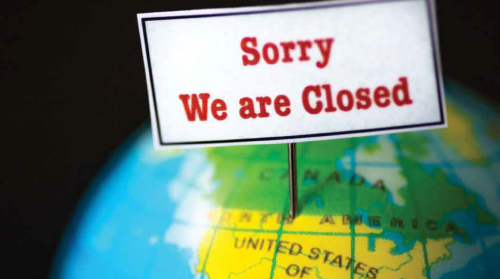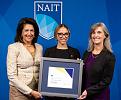- FMA
- The Fabricator
- FABTECH
- Canadian Metalworking
Survey: Manufacturing industry continues to lose millions because of border issues
- June 24, 2021
- News Release
- Health & Safety
The Canadian Tooling & Machining Association (CTMA), in partnership with the Canadian Association of Moldmakers (CAMM), Automate Canada, and the Niagara Industrial Association (NIA), recently conducted a second survey to measure the effects of border closures due to the COVID-19 pandemic within the manufacturing industry.
This updated study was to compare the results to the previous survey about common border crossing issues that have been experienced by those in the industry, who have identified that many of their businesses rely on travel between the U.S. and Canada. There were 91 responses to this follow up survey, which is a substantial increase over the 39 responses in the December 2020 survey.
The severity of the issue continues. In December 2020, an average of 70 per cent of employers reported quarantine orders for employees and visitors and denial of entry by visitors into Canada. In May 2021, this increased to 87 per cent. A total of 69 per cent of respondents claimed to have experienced loss of contracts because of border issues.
“It’s clear from the increased participation in the survey that the issues at the border have left manufacturers with high risk for current contracts and potentially irreversible damage to customer relationships,” said Jeanine Lassaline-Berglund, president, CAMM.
The financial effect varies among respondents. Although some participants were reluctant to share financial information because of issues with confidentiality, the majority noted there were undeniable losses from 2021 because of the interruption of COVID-19-related protocols. Of those who commented, 64.9 per cent stated a combined actual financial effect of $100,000 to $10,000,000 for 2020, and 65.4 per cent revealed an estimated financial effect of $100,000 to more than $5,000,000 for 2021.
Although most of the border crossing happens at the Ambassador Bridge and Windsor Tunnel (more than 80 per cent of respondents), other crossings in the survey results include Sarnia Bluewater Bridge, Fort Erie Peace Bridge, Lester B Pearson International Airport, Niagara Rainbow Bridge, and Cornwall Seaway International Bridge.
“The current restrictions governing travel across the Canadian/U.S. border do not fully acknowledge or consider the growing concerns among manufacturers," said Sophia De Luca, operations manager, NIA. "These survey results provide further evidence to suggest that such restrictions need to adopt more specific guidelines that recognize circumstances for safe and timely travel of manufacturers, technicians, or specified service workers across the border for maintenance of ongoing industrial projects.”
The associations recommend government officials provide a clearer definition of "essential workers" to help Canada Border Services Agency personnel better understand the guidelines, provide more detail on documentation requirements, and implement rapid testing at ports of entry to reduce quarantine periods for individuals travelling across the border to perform essential services.
“The information obtained in this survey sends a clear message to government officials that we need to move forward with some decisive action and find an immediate solution to these issues,” said Robert Cattle, executive director, CTMA. “The announcement made on June 21 that vaccinated Canadians can now return to Canada without quarantine is just a first step and we must continue to apply pressure to put in place measures for safe travel for both U.S and Canadian citizens between our two countries.”
Related Companies
subscribe now


Keep up to date with the latest news, events, and technology for all things metal from our pair of monthly magazines written specifically for Canadian manufacturers!
Start Your Free Subscription- Industry Events
MME Saskatoon
- May 28, 2024
- Saskatoon, SK Canada
CME's Health & Safety Symposium for Manufacturers
- May 29, 2024
- Mississauga, ON Canada
DiPaolo Machine Tools Open House 2024
- June 4 - 5, 2024
- Mississauga, ON Canada
FABTECH Canada
- June 11 - 13, 2024
- Toronto, ON Canada
Zoller Open House & Technology Days 2024
- June 12 - 13, 2024
- Ann Arbor, MI




















